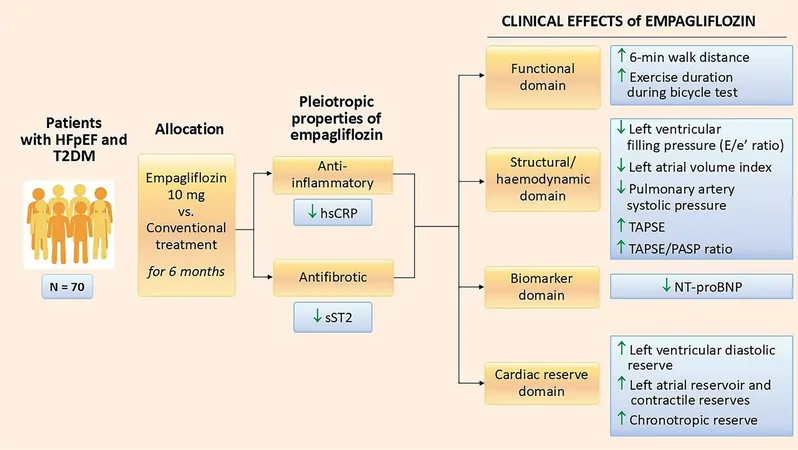
Unlocking Heart Health: The Surprising Benefits of Empagliflozin for Diabetics with Heart Failure
2025-05-09
Author: Wei Ling
A Groundbreaking Study on Diabetics at Risk
In an enlightening randomized study, researchers explored the effects of **empagliflozin**, a groundbreaking SGLT2 inhibitor, on patients aged 40 and above suffering from **type 2 diabetes mellitus (T2DM)** and heart failure with preserved ejection fraction (HFpEF). The cohort included 70 participants who had stable heart conditions and were undergoing essential glucose-lowering therapy.
Setting the Stage: Who Were the Participants?
The participants were carefully screened and met strict criteria: they had to be stable and ambulatory, with a heart failure classification of New York Heart Association (NYHA) classes II-III, and an ejection fraction of at least 50%. Those with a history of severe hypoglycemia, uncontrolled diabetes, or significant cardiac abnormalities were excluded.
How the Study Unfolded
Conducted between March 2019 and September 2021, the study enrolled patients who were randomly assigned to receive either empagliflozin (10 mg daily) or conventional antidiabetic treatment for six months. Both groups underwent lifestyle modifications and received guidance aimed at improving overall health.
Measuring Results: Quality of Life and Heart Health
The researchers evaluated the participants at the beginning and end of the study using various methods, including the **Minnesota Living with Heart Failure Questionnaire** and the **six-minute walk test** (6MWTD) to assess quality of life and functional capacity. Significant improvement was noted in the empagliflozin group over the control group—a promising sign for heart failure patients.
Unveiling Cardiac Reserves: A Heartfelt Transformation
After treatment, those on empagliflozin recorded a remarkable 16-meter increase in 6MWTD compared to just 3 meters for the control group, highlighting its potential to enhance physical endurance. Notably, the empagliflozin group exhibited significant decreases in left ventricular filling pressures and improved pulmonary health metrics, showcasing the medication's multifaceted benefits.
Biomarker Breakdown: The Key to Heart Health
The study also focused on critical biomarkers linked to heart stress, inflammation, and heart function. Not only did empagliflozin reduce levels of the inflammatory and profibrotic markers, but it was also associated with substantial decreases in NT-proBNP, a key biomarker indicating heart failure severity. These findings reveal the medication's role in reducing cardiac strain.
Conclusion: A New Hope for Patients with HFpEF
The results of this study suggest that empagliflozin does more than just manage blood sugar levels; it may significantly improve functional capacity and quality of life in patients suffering from HFpEF and T2DM. These insights could herald a new therapeutic path for this challenging patient population, bringing hope and better health outcomes.
Broader Implications: What This Means for Your Health
As heart failure continues to be a leading cause of morbidity and mortality, especially among diabetic patients, studies like these shed light on promising treatment avenues. Empagliflozin stands out not merely for its glucose-lowering capabilities, but for its potential to fundamentally enhance cardiac performance, opening the door for future research and treatment strategies.




 Brasil (PT)
Brasil (PT)
 Canada (EN)
Canada (EN)
 Chile (ES)
Chile (ES)
 Česko (CS)
Česko (CS)
 대한민국 (KO)
대한민국 (KO)
 España (ES)
España (ES)
 France (FR)
France (FR)
 Hong Kong (EN)
Hong Kong (EN)
 Italia (IT)
Italia (IT)
 日本 (JA)
日本 (JA)
 Magyarország (HU)
Magyarország (HU)
 Norge (NO)
Norge (NO)
 Polska (PL)
Polska (PL)
 Schweiz (DE)
Schweiz (DE)
 Singapore (EN)
Singapore (EN)
 Sverige (SV)
Sverige (SV)
 Suomi (FI)
Suomi (FI)
 Türkiye (TR)
Türkiye (TR)
 الإمارات العربية المتحدة (AR)
الإمارات العربية المتحدة (AR)